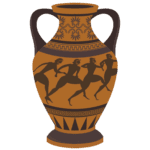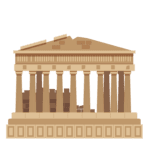Ancient Greece Facts for Kids
Check out these amazing Ancient Greece facts for kids! Become an expert on the Ancient Greeks in no time. From City-States to the Olympics, there is so much to learn.
Check out these amazing Ancient Greece facts for kids! Become an expert on the Ancient Greeks in no time. From City-States to the Olympics, there is so much to learn.


Ancient Greece was made up of small city-states, each with its own government and way of life. The most famous city-states were Athens and Sparta, which were known for their powerful armies and cultural achievements.
These city-states were often in competition with one another, but they also formed alliances and cooperated on matters of common interest.


Ancient Greek pottery was an important form of art and craftsmanship in ancient Greece. Greek potters were known for their skill and creativity in producing a wide range of pottery, from simple household utensils to ornate decorative objects.
Ancient Greek pottery was decorated with scenes of soldiers, gods or daily life, as well as geometric patterns.


The Greeks built impressive architectural structures, including the Parthenon in Athens and the Colossus of Rhodes.
The Parthenon is a temple dedicated to the goddess Athena, and it is considered one of the greatest examples of ancient Greek architecture.
The Colossus of Rhodes was a giant statue of the sun god Helios, which was one of the Seven Wonders of the Ancient World.
The Greeks were also known for their Olympic Games, held every four years in Olympia to honour the god Zeus.
The games were a major cultural event and athletes from all over Greece would compete in various sports such as running, jumping and wrestling.
The Greeks invented democracy, a form of government in which citizens have a say in making laws and decisions.
The city-state of Athens is considered the birthplace of democracy, where citizens could participate in government by voting in the assembly.
The Greeks believed in many gods and goddesses, who they believed controlled the natural world and human fate. They believed that the gods lived on Mount Olympus and that they could influence human affairs.
The Greeks built many temples and shrines to the gods and goddesses and held festivals and ceremonies to honour them.
The Greeks wrote many famous plays and stories, such as the tragedies of Sophocles and the comedy of Aristophanes. These plays were often performed in the theatres and were very popular among the citizens.
They also wrote many famous stories and myths, such as the story of the Trojan War and the adventures of Odysseus.
The Greeks were skilled sailors and traders, and their ships and colonies could be found throughout the Mediterranean.
They established colonies on the coasts of Italy, Sicily, and Turkey, which helped to spread Greek culture and ideas throughout the region.
The Greeks made important contributions to the fields of maths, science and medicine. They developed geometry, a branch of mathematics that deals with shapes and sizes of figures.
They also studied astronomy and made observations about the stars and planets.
The Hippocratic Corpus is a collection of texts that contains the earliest known works of Western medicine.
The Ancient Greek civilisation greatly influenced the Roman Empire and Western civilisation as a whole. Many of the ideas and institutions of the Greeks, such as democracy, philosophy and drama, were adopted and developed by the Romans and continue to be important in Western culture today.
The Greek language, mythology and art also continue to be studied and admired by people all over the world.